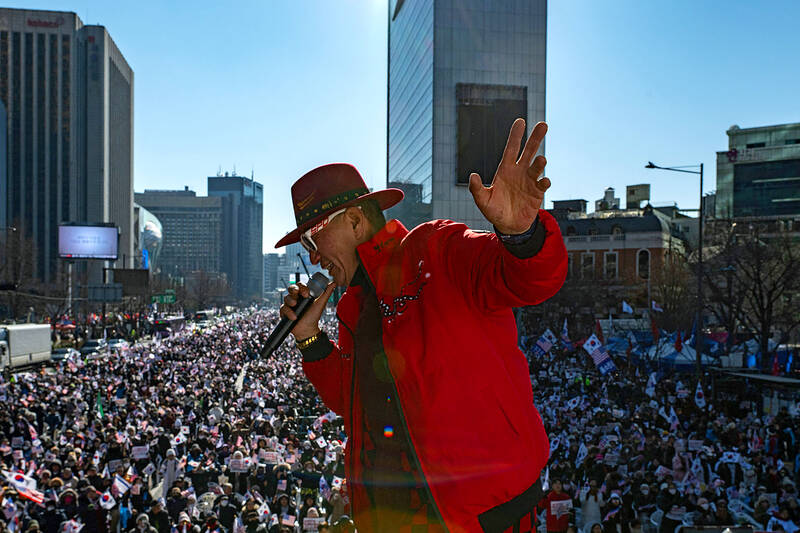Thousands of rival South Korean protesters rallied in the capital yesterday, a day after a failed attempt to arrest suspended South Korean President Yoon Suk-yeol for imposing a short-lived martial law decree that led to his impeachment.
The country has been plunged into political chaos since last month, with Yoon defiantly holed up in the presidential residence, surrounded by hundreds of loyal security officers who have so far resisted efforts by prosecutors to arrest him.
Thousands of protesters, both for and against Yoon, gathered in front of the residence and along major roads in Seoul yesterday — either demanding his arrest or calling for his impeachment to be declared invalid.

Photo: AFP
Supporter Kim Chul-hong, 60, said Yoon’s arrest could undermine South Korea’s security alliance with the US and Japan.
“Protecting President Yoon means safeguarding our country’s security against threats from North Korea,” he said.
Members of the Korean Confederation of Trade Unions, South Korea’s largest umbrella union, attempted to march to Yoon’s residence to protest against him, but were blocked by police. It said two of its members were arrested, and several others were injured in clashes.
Yoon faces criminal charges of insurrection, one of a few crimes not subject to presidential immunity, meaning he could be sentenced to prison or, at worst, the death penalty.
If the warrant is executed, Yoon would become the first sitting South Korean president to be arrested.
Investigators have asked South Korean Minister of Finance Choi Sang-mok, who was installed as acting president a week ago, to back the warrant by ordering the presidential security service to cooperate.
In scenes of high drama on Friday, Yoon’s guards and military troops shielded him from investigators who eventually called off the arrest attempt, citing safety concerns.
The showdown — which reportedly included shoving, but no shots fired — left the warrant in limbo, with the court order set to expire tomorrow.
The Corruption Investigation Office for High-ranking Officials could make another bid to arrest him before then.
However, if the warrant lapses, they may apply for another.
The South Korean Constitutional Court slated Jan. 14 for the start of Yoon’s impeachment trial, which if he does not attend would continue in his absence.
Former South Korean presidents Roh Moo-hyun and Park Geun-hye never appeared for their impeachment trials.
Yoon’s lawyers decried Friday’s arrest attempt as “unlawful and invalid,” and vowed to take legal action.
Experts said investigators could wait for greater legal justification before attempting to arrest the suspended president again.

INVESTIGATION: The case is the latest instance of a DPP figure being implicated in an espionage network accused of allegedly leaking information to Chinese intelligence Democratic Progressive Party (DPP) member Ho Jen-chieh (何仁傑) was detained and held incommunicado yesterday on suspicion of spying for China during his tenure as assistant to then-minister of foreign affairs Joseph Wu (吳釗燮). The Taipei District Prosecutors’ Office said Ho was implicated during its investigation into alleged spying activities by former Presidential Office consultant Wu Shang-yu (吳尚雨). Prosecutors said there is reason to believe Ho breached the National Security Act (國家安全法) by leaking classified Ministry of Foreign Affairs information to Chinese intelligence. Following interrogation, prosecutors petitioned the Taipei District Court to detain Ho, citing concerns over potential collusion or tampering of evidence. The

Seventy percent of middle and elementary schools now conduct English classes entirely in English, the Ministry of Education said, as it encourages schools nationwide to adopt this practice Minister of Education (MOE) Cheng Ying-yao (鄭英耀) is scheduled to present a report on the government’s bilingual education policy to the Legislative Yuan’s Education and Culture Committee today. The report would outline strategies aimed at expanding access to education, reducing regional disparities and improving talent cultivation. Implementation of bilingual education policies has varied across local governments, occasionally drawing public criticism. For example, some schools have required teachers of non-English subjects to pass English proficiency

‘FORM OF PROTEST’: The German Institute Taipei said it was ‘shocked’ to see Nazi symbolism used in connection with political aims as it condemned the incident Sung Chien-liang (宋建樑), who led efforts to recall Democratic Progressive Party (DPP) Legislator Lee Kun-cheng (李坤城), was released on bail of NT$80,000 yesterday amid an outcry over a Nazi armband he wore to questioning the night before. Sung arrived at the New Taipei City District Prosecutors’ Office for questioning in a recall petition forgery case on Tuesday night wearing a red armband bearing a swastika, carrying a copy of Adolf Hitler’s Mein Kampf and giving a Nazi salute. Sung left the building at 1:15am without the armband and apparently covering the book with a coat. This is a serious international scandal and Chinese

TRADE: The premier pledged safeguards on ‘Made in Taiwan’ labeling, anti-dumping measures and stricter export controls to strengthen its position in trade talks Products labeled “made in Taiwan” must be genuinely made in Taiwan, Premier Cho Jung-tai (卓榮泰) said yesterday, vowing to enforce strict safeguards against “origin laundering” and initiate anti-dumping investigations to prevent China dumping its products in Taiwan. Cho made the remarks in a discussion session with representatives from industries in Kaohsiung. In response to the US government’s recent announcement of “reciprocal” tariffs on its trading partners, President William Lai (賴清德) and Cho last week began a series of consultations with industry leaders nationwide to gather feedback and address concerns. Taiwanese and US officials held a videoconference on Friday evening to discuss the